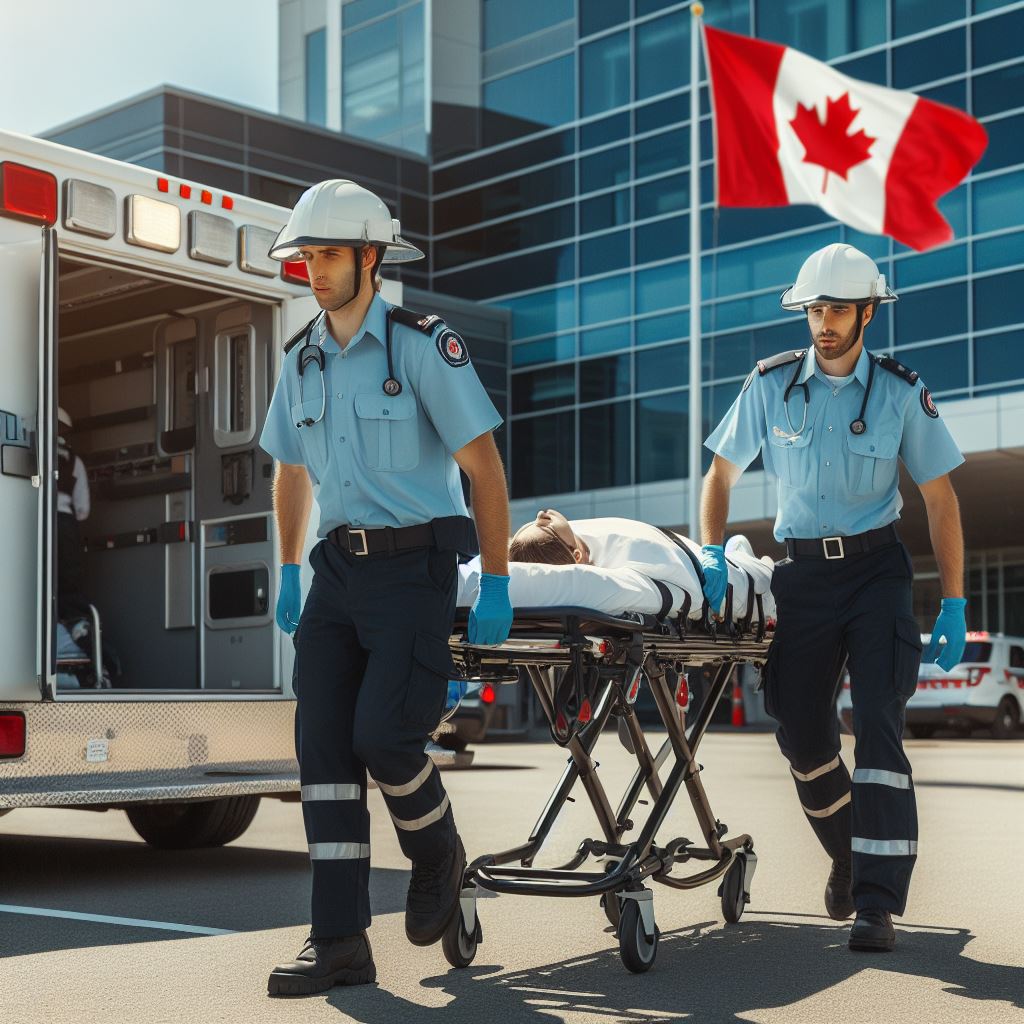Introduction
Paramedics are healthcare heroes, delivering vital emergency medical care with precision and urgency.
Specializations within this field are paramount, ensuring expertise in diverse scenarios.
Advanced training empowers paramedics to navigate critical situations seamlessly, from trauma response to cardiac emergencies.
These specialized skills enhance overall patient outcomes, emphasizing the dynamic nature of pre-hospital care.
Whether it’s pediatric emergencies, disaster response, or advanced life support, each specialization caters to specific needs.
The importance of these focused skill sets cannot be overstated, underscoring the evolving landscape of paramedicine.
In this blog post, we delve into the intricacies of various paramedic specializations, exploring how they contribute to the overall efficiency and effectiveness of emergency medical services.
Overview of Paramedic Specializations
Definition of paramedic specializations
Paramedic specializations are focused areas within the field that allow paramedics to develop specific skills and expertise.
Importance of specialization in enhancing skills and knowledge
Specialization is crucial for paramedics as it enables them to acquire specialized skills and in-depth knowledge in specific areas of practice.
Various specializations available in the field
- Emergency Medical Technician (EMT): Entry level specialization providing basic emergency medical care.
- Advanced Emergency Medical Technician (AEMT): Builds upon EMT skills by performing advanced medical procedures.
- Critical Care Paramedic: Provides advanced care to critically ill or injured patients in specialized environments.
- Flight Paramedic: Specializes in providing medical care during aeromedical transport.
- Tactical Paramedic: Trained to work in high-risk law enforcement situations and provide medical support.
- Community Paramedic: Focuses on preventive care and health management within the community.
- Pediatric Paramedic: Specializes in caring for infants, children, and adolescents in emergency situations.
- Geriatric Paramedic: Provides specialized care for the elderly, addressing unique healthcare needs.
- Disaster Paramedic: Trained to respond effectively in emergency situations and provide disaster medical assistance.
Brief description of each specialization and their specific roles
- Emergency Medical Technician (EMT): EMTs are the first responders who provide initial care to patients, stabilize injuries, and transport patients to medical facilities.
- Advanced Emergency Medical Technician (AEMT): AEMTs have additional training and skills, allowing them to administer medications, perform advanced airway management, and use advanced equipment.
- Critical Care Paramedic: Critical Care Paramedics are trained to provide advanced life support, monitor patients in critical condition, and manage complex medical interventions.
- Flight Paramedic: Flight Paramedics work in helicopters or airplanes, providing medical care in high-pressure situations and during transport.
- Tactical Paramedic: Tactical Paramedics operate within law enforcement units, providing immediate medical assistance during SWAT operations or other high-risk events.
- Community Paramedic: Community Paramedics work within communities, focusing on preventive care, health promotion, chronic disease management, and referrals to appropriate healthcare services.
- Pediatric Paramedic: Pediatric Paramedics specialize in pediatric emergency care, ensuring accurate assessment and treatment of infants, children, and adolescents.
- Geriatric Paramedic: Geriatric Paramedics are trained to address the unique needs of the elderly population, including recognizing age-related conditions and providing optimal care.
- Disaster Paramedic: Disaster Paramedics have specialized training to respond to natural disasters, mass casualties, and other emergency situations, providing immediate medical assistance and triage.
Generally, paramedic specializations play a vital role in the field by allowing paramedics to develop specialized skills and knowledge.
Each specialization has specific roles and responsibilities, catering to different patient populations and emergency situations.
These specializations ensure that paramedics can provide the highest level of care in their chosen area of expertise.
Read: A Day in the Life of a Public Health Officer
Benefits of Specializing
Specializing in a specific area within the field of paramedicine offers numerous benefits. These benefits extend to both the individual paramedic and the patients they serve.
In this chapter, we will explore the advantages of paramedic specializations.
Enhanced expertise and knowledge in a specific area
By specializing in a specific area, paramedics are able to focus their skill development and knowledge acquisition.
This allows them to become experts in their chosen field, providing a higher level of care and knowledge than their peers who have not specialized.
Improved patient care and outcomes
Paramedic specializations result in improved patient care and outcomes.
A paramedic who specializes in pediatric emergency medicine, for example, will have the specialized knowledge and experience to handle pediatric patients more effectively, resulting in better outcomes for those patients.
Increased career opportunities and job prospects
Specializing in a specific area of paramedicine opens up a variety of career opportunities and job prospects.
Paramedics with specializations may find themselves in high demand, whether it be in hospitals, specialized rescue teams, or other healthcare settings.
Professional growth and development
Specializing in a specific area allows paramedics to continually grow and develop professionally.
They can attend specialized training programs, conferences, and workshops that focus on their chosen field, allowing them to stay up-to-date with the latest advancements and techniques.
Potential for higher salaries and job satisfaction
Paramedics who specialize often have the potential for higher salaries and increased job satisfaction.
Their specialized skills and knowledge are highly valued, and therefore they may be eligible for higher pay scales and more fulfilling career opportunities.
Unlock Your Career Potential
Visualize a clear path to success with our tailored Career Consulting service. Personalized insights in just 1-3 days.
Get StartedIn fact, paramedic specializations offer a range of benefits that contribute to both the individual paramedic’s professional growth and development and the overall quality of patient care.
From enhanced expertise and knowledge to increased career opportunities and potential for higher salaries, specializing in a specific area within paramedicine is a wise career choice for those looking to excel in their field.
Read: How to Become a Paramedic in Canada

Uncover the Details: Public Health vs. Clinical Medicine Careers
See Related Content: Healthcare Policy Impact on Admin Roles
Steps to Specialize as a Paramedic
Embarking on a journey toward paramedic specialization starts with fundamental training and certification.
This initial phase equips individuals with essential knowledge and skills, forming the bedrock of their paramedic practice.
Post-basic training, paramedics can explore a spectrum of specializations aligning with personal interests and career aspirations.
Specialties encompass critical care, neonatal care, and other focused areas, tailoring paramedics’ roles to specific domains.
Choosing a specialization prompts paramedics to pursue supplementary certifications or specialized training.
For instance, a critical care focus might lead to certifications in advanced cardiac life support (ACLS) and critical care paramedicine.
Paramedics delve deeper into their chosen fields through specialized coursework, tackling topics such as equipment usage and condition-specific protocols.
Practical experience follows, with clinical rotations or internships providing hands-on learning under seasoned professionals.
Staying current in the ever-evolving field demands continuous education. Paramedics attend workshops, conferences, and seminars, ensuring they remain abreast of the latest research and technological advances in their specialization.
In general, the journey to becoming a specialized paramedic involves sequential steps, from foundational training to hands-on experience and continuous education.
Through this process, paramedics cultivate expertise, offering tailored care to those they serve.
Read: Paramedics’ Role in Public Health Emergencies
Challenges and Considerations
Increased time and commitment required for specialization
- Paramedics pursuing specialization must invest more time and effort into additional training and education.
- Specialized courses and programs can be time-consuming, taking away from personal and professional commitments.
- Paramedics may need to complete additional clinical hours and practical experience to become proficient in their chosen specialization.
- Continuous learning and staying up-to-date with advancements in specialized fields may require ongoing commitment.
- Balancing work, personal life, and specialization can be challenging, requiring effective time management skills.
Financial considerations for additional certifications or training
- Pursuing specialization often involves additional expenses such as course fees, material costs, and certification fees.
- Some specialized areas may require travel or relocation, adding to the financial burden.
- Paramedics may need to invest in specialized equipment or resources for their chosen field.
- Financial planning and budgeting may be necessary to afford the costs associated with specialization.
- Seeking financial assistance through scholarships or grants may be an option for paramedics pursuing specialization.
Physical and emotional demands in certain specialized roles
- Certain specializations, such as working in critical care or trauma, can be physically demanding and require excellent stamina.
- Paramedics specializing in fields like disaster response or search and rescue may face emotionally challenging situations.
- Specialized roles often involve high-pressure environments and decision-making under stressful circumstances.
- Mental resilience and emotional well-being are crucial for paramedics dedicated to specialized roles.
- Paramedics may need to undertake additional physical fitness training to meet the demands of their chosen specialization.
Maintaining a work-life balance while pursuing specialization
- Pursuing specialization may require paramedics to juggle work, education, and personal responsibilities.
- Specialized training or education can be time-consuming and lead to increased work hours or schedule adjustments.
- Effective time management skills and setting boundaries are essential to achieving a work-life balance.
- Paramedics may need to communicate their needs and limitations to maintain healthy relationships and responsibilities outside of work.
- Support systems, such as family and friends, can play a crucial role in navigating work-life balance challenges during specialization.
Read: Understanding Paramedic Salary Ranges in Canada
Conclusion
Recap of the importance of paramedic specializations
Throughout this blog post, we have explored the various specializations available to paramedics, and the importance of these specializations in enhancing patient care.
Specialized knowledge and skills enable paramedics to provide more advanced and targeted treatment to specific patient populations.
Encouragement for paramedics to consider specialization as a means to enhance their careers
For paramedics looking to take their careers to the next level, pursuing a specialization can be highly beneficial.
It not only allows for personal and professional growth but also opens up new opportunities for career advancement and higher salaries.
Final thoughts on the topic
Paramedic specializations are a pivotal part of the healthcare industry, as they ensure that patients receive specialized care tailored to their unique needs.
By advancing their skillset, paramedics play a crucial role in improving patient outcomes and overall healthcare provision.
As the field of emergency medicine continues to evolve, paramedics must continually evaluate their career aspirations and consider pursuing specializations to stay current and provide the best possible care to their patients.
In summary, paramedic specializations are not only important but also highly beneficial for paramedics seeking professional growth and improved patient care.
By embracing specialized training and expertise, paramedics can unlock new opportunities and make a lasting impact in the field of emergency medicine.




